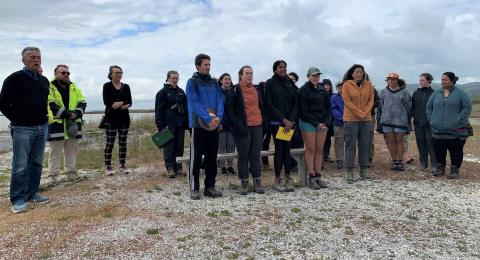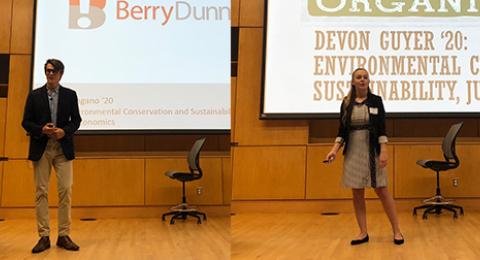The Environmental Conservation and Sustainability minor at UNH provides you with the knowledge and skills to address critical environmental challenges, focusing on sustainable practices and conservation strategies. This minor appeals to students passionate about protecting the environment and interested in creating a more sustainable future and is Ideal for those who enjoy interdisciplinary learning and problem-solving.
What is environmental conservation and sustainability?
Environmental conservation and sustainability is centered around a vision of a future where people live with respect for the Earth’s natural systems and each other. You’ll learn the impacts of technology and human activity on the environment, study the principles of sustainability, and gain an understanding of the complex relationships between human societies and the environment. You’ll be able to focus on topics such as ecology, social science and management, and conservation and sustainability. The minor is a compliment to majors in a wide range of subjects, including agriculture, business, natural resources and zoology.
Why study environmental conservation and sustainability at UNH?
Our graduates are environmental citizens, sustainability advocates and leaders for constructive change. We equip students not just with knowledge, but with the skills to solve real-world problems and work collaboratively with diverse interest groups to facilitate policy and action toward a sustainable future. Many students pursue international experiences, such as UNH’s EcoQuest program in New Zealand, or research opportunities with our faculty or through undergraduate research opportunity programs.
Potential career areas
- Advocacy and regulatory affairs
- Agriculture
- Biology
- Business consultation
- Conservation management
- Environmental education and outreach
- Land-use analysis
- Natural resources management
- Zoologist
Curriculum & Requirements
The minor in Environmental Conservation and Sustainability allows students from diverse majors across all UNH colleges to incorporate the theory and practice of sustainable resource use into their 4-year baccalaureate studies. Students take required introductory courses in both conservation and sustainability and then can fill out their minor with choices from ecology, social science and management, and a range of advanced topics. As well, students who participate in the EcoQuest Study Abroad Program can apply their courses to the minor.
- Academic policies related to Minors.
- The minor consists of completing five courses (20 credits).
- Students much achieve a grade of C- or better for all courses counted towards the Environmental Conservation and Sustainability minor.
- No more than 8 credits used to satisfy major requirements may be used for the minor
- Credit/fail courses may not be used for the minor.
| Code | Title | Credits |
|---|---|---|
| Required Courses | ||
| NR 435 | Contemporary Conservation Issues and Environmental Awareness | 4 |
| NR 437 | Principles of Sustainability | 4 |
| Ecology Course | ||
| Select one course from the following: | 4 | |
AGFS 502 | Agroecology | |
BIOL 541W | Ecology | |
NR 433 | Wildlife Ecology | |
NR 527 | Forest Ecology | |
NR 660 | Ecology and Biogeography of New Zealand | |
| Social Science and Management Course | ||
| Select one course from the following: | 4 | |
NR 507 | Introduction to our Energy System and Sustainable Energy | |
NR 602 | Natural Resources and Environmental Policy | |
NR 607 | Land Economics Perspectives: Uses, Policies, and Taxes | |
NR 662 | Environmental Policy, Planning and Sustainability in New Zealand | |
CEP 627 | Community Economics | |
NR 786 | Leadership for Sustainability | |
| Advanced Topics in Conservation and Sustainability Course | ||
| Select one course from the following: | 4 | |
NR 606 | International Energy Topics | |
NR 650 | Principles of Conservation Biology | |
NR 661 | Restoration Ecology and Ecosystem Management in New Zealand | |
NR 708W | Environmental Economics | |
NR 720 | International Environmental Politics and Policies for the 21st Century | |
NR 724 | Resolving Environmental Conflicts | |
NR 767W | Social Impact Assessment | |
NR 784 | Sustainable Living - Global Perspectives | |
NR 785 | Systems Thinking for Sustainable Solutions | |
NR 787 | Advanced Topics in Sustainable Energy | |
NR 795 | Investigations 1 | |
MARI 705 | Introduction to Marine Policy: Understanding US Ocean, Coastal and Great Lakes Policy | |
MEFB 702 | Sustainable Marine Fisheries | |
| Total Credits | 20 | |
- 1
NR 795 Investigations requires working with an individual ECS faculty member on a special problem/issue.
Program Learning Outcomes
Students will be able to:
- Formulate tests of environmental questions, acquire data, and apply scientific methods to answer these questions;
- Describe and explain the ecological and societal value of biodiversity, sustainability, and environmental stewardship;
- Use principles of ecology, economics, sustainability, and policy science to solve real-world environmental problems;
- Communicate effectively to peers within the environmental community and with audiences outside of the discipline.

















